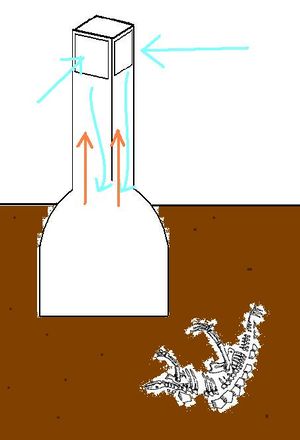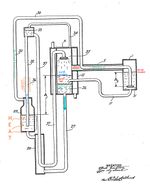Refrigeration
Main > Housing and construction > Home fittings
Main > Food and Agriculture > Food Storage and Processing
Thermal mass fridge
Described in Volume III of the Earthship manual. Basically uses the coolness of the earth in summer to keep cool.
Persian windcatchers
A windcatcher is a tower rising up to catch high winds and funnel them down into an area to be cooled. Simultaneously, it acts as a chimney letting hot air rise out.
Eutectic Fridge
Designing a refrigeration on the Eutectic cell or Eutectic fridge principal can increase efficiency by a great deal. By using the phase change point of a medium you get to utilize temperature regulation at an optimum desired point, and only using the compressor after phase change has occurred. The thermal mass has an advantage here of being able to absorb heat without changing in temperature during phase transition. it means a compressor or regulator can be utilized less. http://www.autofridge.com.au/page/technical_information.html http://www.ozefridge.com.au/?page_id=22
Heat Pump
A heat pump can produce cooling in one region, and heat on another. A complete home hot water/heating and refrigeration/air cooling system could use a heat pump to eliminate both needs with one system. http://en.wikipedia.org/wiki/Heat_pump A heat pump is also a rare and useful case in thermodynamic engineering where total energetic output can exceed input the user paid for - the electricity used for the compressor. The additional energetic input is acquired from the environment. A common fridge can produce 3-5 times more energy than electrically input as an example.
In a heat pump total output = (energy for compression + energy provided by environment) * efficiency
eg. 2.5 units = (2 units + 3 units) * 50%
COP (Coefficient of Performance) Formula = total output / input you paid for (energy for compression)
eg. COP 1.25 = 2.5 / 2
Therefore it is possible in a heat pump for total output to exceed the input the user paid for, like flying a kite. You only hold the string, the wind does the rest - both are required though for the system to work.
Einstein fridge
Albert Einstein invented a refrigerator with no moving parts. It is powered by applying heat to one of the chambers; no electricity is required. The File:Einstein Fridge.pdf gives basic plans of how it works. This should be developed into a full open-source design with building instructions, bill of materials etc. It fulfils all the criteria for an Open Ecology product: it is in the public domain, it should last a lifetime and be cheap to build, it would be extremely useful to an off-grid community, it could help alleviate poverty .
Evaporative Cooling
Very low energy consumption is required to use evaporative cooling. In the case of evaporative cooling, efficiency is reduced with increased humidity in the environment. http://en.wikipedia.org/wiki/Coolgardie_safe
Concept for combined thermal mass/ windcatcher system

Fridge efficiency methods
fullness: If a fridge has more space it thus has more air to cool to keep food below room temperature, So keeping space occupied in a fridge leads to energy savings. Shape: Simply put it should be a box with a lid that holds the cold air in when it opened like a deep-freeze. [1]
As the Earthships manual points out, it is wasteful to put a fridge in a heated room (as most homes do). If you want to keep the fridge cool, allow it access to cool outside air.
Converting a freezer to a high-efficiency fridge
See the links below for a very simple open-source method to convert a chest freezer into a fridge. The fridge will run on 150 Watt-hours per day (equivalent to running a laptop for 2 hours); 1000 Watt hours a day is normal. The fridge has the door on the top, which means cold air tends to sit inside it.
The converted fridge yields a lifetime of service, so we can modify/fabricate with a basic CNC mill.
- Article and instructions on the conversion. You need something like this Freezer Temperature Controller ($53 on Amazon) to cut the power off when the freezer cools itself to fridge temperature (about 4oC or 39oF)
- http://blog.holyscraphotsprings.com/2010/09/chest-freezer-to-fridge-conversion-1900.html
- http://www.aselfsufficientlife.com/chest-freezer-to-fridge-conversion-the-most-energy-efficient-fridge-ever.html
Sundanzer
According to Abe at Velacreations, his Sundanzer uses 50 Watt hours per day, but it is a small refrigerator. It was $800 direct from the factory (it had a cosmetic blemish). The lifetime is 20 years+, pretty much like any fridge or freezer. It is a chest fridge, extra insulation, very efficient. You can get them in freezer models as well.
STEVEN Ammonia Freezer
The basic principles of operation and simple construction of this ammonia absorption solar powered freezer should be easy to adapt to OSE's purposes. Combined with a high thermal mass insulated storage area, this could provide both refrigeration AND freezer storage year round.
Media:AmmoniaAbsorptionIcemaker.pdf

